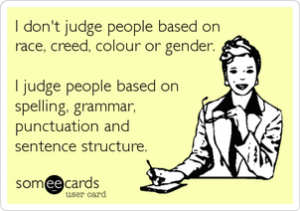18 Mar
2016
Why Grammar is Necessary for Clarity – Part 1 The Hyphen
Many believe that grammar is the sole, esoteric preserve of a small number of aficionados who delight in pointing out misplaced apostrophes or complaining that the supermarket express checkout refers to “less than 10 items” instead of “fewer than…”. These people may feel that worrying obsessively over grammar will stem their creativity – or perhaps that grammar is outdated in a 21st-century world of instant communications.

But grammar is not just about being pedantic; it’s about clarity. Incorrect grammar can make a basic statement ambiguous at best and almost impossible to comprehend at worst. We are featuring a series of blog posts over the next four weeks, dealing with different grammatical issues that affect clarity. First, the hyphen!
Why is the hyphen so important? Because there’s a world of difference between a small business owner and a small-business owner. (Unless, of course the small-business owner also happens to be particularly short…).

Similarly, a little used couch is not ths same as a little-used couch. So, hyphens give clarity to your writing.
If confusion could possibly result – it’s advisable to use a hyphen:
A low-level field… (or a low, level field)
When to hyphenate modifiers – and when not to:
When compound modifiers are used immediately preceding the noun they qualify, they are generally hyphenated. For example:
…a user-friendly website…
…a strong-willed adversary…
These same compound modifiers do not take a hyphen if they come after the noun:
The new website is definitely more user friendly.
My political opponent is very strong willed.
When an adjective is preceded by an adverb, generally no hyphen is needed. Hence:
…a highly qualified scientist…
…a happily married man…

Exceptions include the use of “well” as a modifying adverb; “well” is always hyphenated when preceding a noun (but not when following – as mentioned above):
…a well-behaved dog…
The dog is well behaved.
Hyphens are also used for ages and time periods, when these are used as modifiers.
A six-month-old baby…
Two-weeks’ notice…
A five-year-old car…
Check back next week for a post on using commas to clarify!




